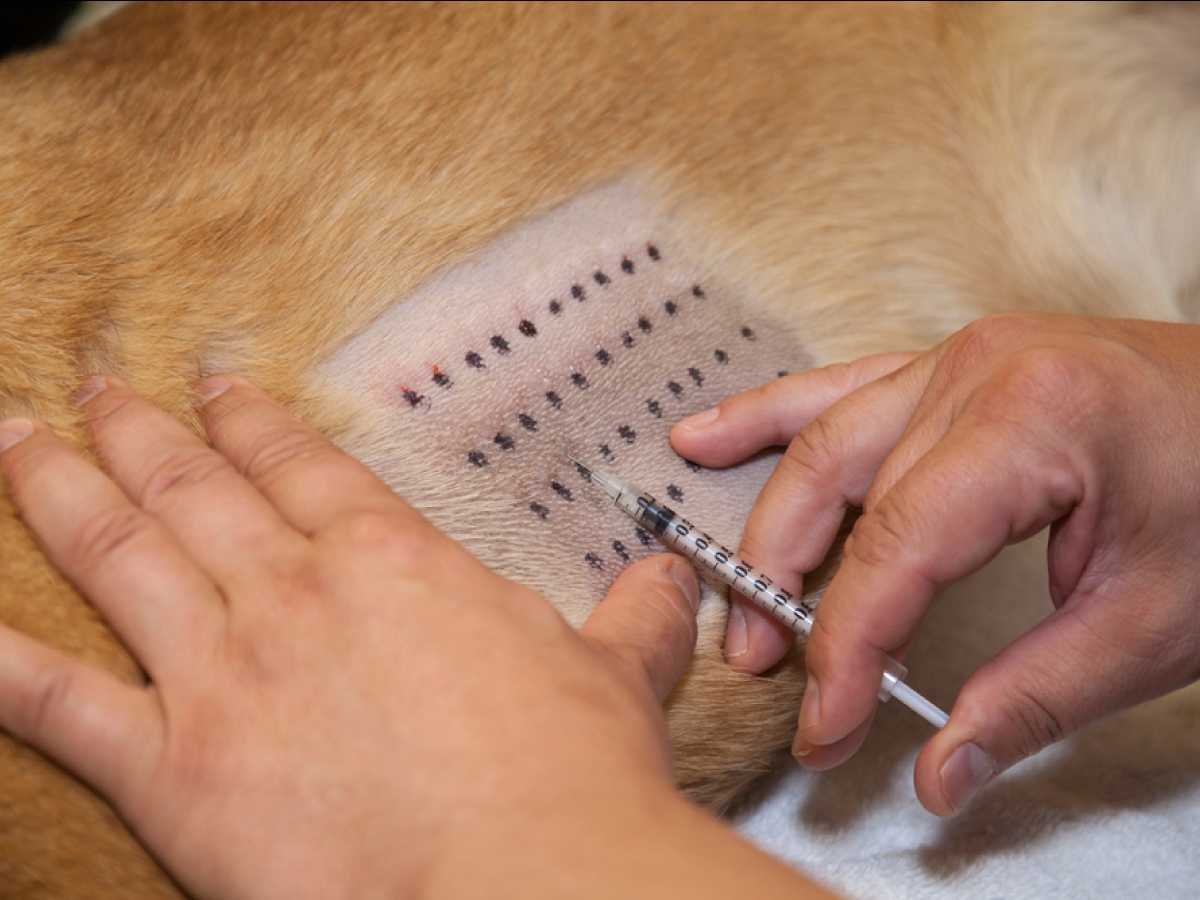What Can I Give My Dog For Allergies: 4 Things To Try
What can I give my dog for allergies? Finn helps sort through all of the information and has four ways you can get your dog relief from their symptoms.
Table of Contents:
Are you tired of watching your dog struggle with constant itching, scratching, and chewing? Any pet owner dealing with allergies knows the struggle of finding the right combination of factors to help manage their dog’s symptoms.
“What can I give my dog for allergies?” is a frequent, frantic 2 a.m. web search for people at their wit’s end, but managing your dog’s allergies doesn’t have to be that complicated. We’re here to help!
What Exactly Causes Pet Allergies, Anyway?
Unfortunately (or fortunately, depending on who you ask!), our dogs can’t talk. That makes veterinary medicine part skill and part luck, especially when dealing with more complex issues like pet allergies.
While we can verbalize that our throat feels itchy after eating certain foods, we are at our dog’s mercy when trying to do the same for them. Often, finding out that your dog has allergies comes down to noticing and interpreting the symptoms so that you can have them officially diagnosed by their veterinarian.
But what causes these allergies in the first place?
No matter the cause, what’s going on in your dog’s body when they are dealing with allergies is more or less the same as what happens to us. Instead of reacting normally to whatever is triggering the allergy , their immune system identifies it as a threat.
Instead of ignoring the particle, like it usually would, the body starts to work to get rid of whatever the “allergen” is. This process is the same one that it uses to fight off bacteria and viruses, with many of the same results.
During this process, two main molecules come into play — mast cells and histamines. When the mast cells are notified that an allergen is present, it releases potent chemical “bodyguards” known as histamines.
If this sounds familiar to you, it’s because one of the more common categories of medications used to counteract this process in human medicine is called an “antihistamine.” Histamines are responsible for many noticeable allergy symptoms, like itching, sneezing, and redness, because it causes inflammation as they work to do their job.
What Commonly Triggers an Allergic Reaction in Dogs?
Like us humans, what triggers a dog to develop allergies can be very individual. While there are more common triggers that we’ll discuss, nearly anything has the potential to become an allergen if the body labels it that way.
In most cases, vets separate allergies in dogs into three main categories. These categories can help them better diagnose the problem, and each has slightly different methods to treat them effectively.
Flea Allergy Dermatitis
When it comes to insect-based allergens, fleas are by far the most common offender.
However, it isn’t the insect bites that cause the issue — it’s the flea’s saliva the body reacts to. This condition is known as flea allergy dermatitis (sometimes condensed simply to FAD).
Just a single bite can cause significant itching, especially on the back, neck, and face. Dogs with this specific allergy tend to scratch almost continually and may even remove their hair in patches.
To treat your dog for flea allergy dermatitis, you also need to treat your home for fleas. This is part of what makes this specific type of allergy so tricky to treat because fleas can be so insidious and difficult to get rid of completely. Prescription flea medication is generally also recommended to prevent them from returning and continuing to cause issues, and you may need to keep your dog on it year-round.
Environmental Allergies
Dogs can suffer from allergies to products found in their environment. These are often seasonal allergies, showing up most frequently in the spring and fall when pollen counts are at their highest.
Common environmental allergies include dust mites, pollens, and even laundry soaps or air fresheners. While they are not as common in dogs as in humans (only about 15% of dogs deal with this type of allergy), they exhibit many of the same symptoms.
Environmental allergies also tend to be either respiratory or skin-based, so dogs will either sneeze, cough, and tear up (with airborne allergens) or itch and chew at their skin (with “atopic” allergens).
Food Allergies
And finally, food allergies. While not seen as much as other types of allergies, they tend to be one of the most tricky to diagnose and treat.
These allergies are most often related to something in the dog’s diet, usually a protein. Common food allergies for dogs include beef, lamb, chicken, wheat, egg, dairy, and fish.
Because these allergens are digested instead of inhaled or topical, dogs tend to exhibit more GI-related symptoms. You may notice this reaction the first time your dog eats a new product that they’re allergic to, or it may take time to develop. Very few food allergies in dogs are anaphylactic emergencies, but it is still a possibility to monitor.
What Are Symptoms of Allergies in Dogs?
The symptoms of allergies in dogs can vary greatly, depending on the trigger. Answering the “what can I give my dog for allergies?” question starts by identifying their triggers and related symptoms so that you can be more specific in finding appropriate relief. This is best done with the help of your veterinarian.
Here are a few of the more common symptoms, but keep an eye out for anything new:
Itching (often localized to specific “hot spots” on the body)
Frequent paw licking and chewing
Coughing
Sneezing
Frequent ear infections
Runny discharge from their eyes and nose
Wheezing
Vomiting
Diarrhea
If you suspect allergies, make a note of anything out of the ordinary for your dog, and bring it with you to your pet’s next vet appointment to discuss a targeted solution. Many of the above symptoms are relatively vague, so your vet will also want to rule out other issues.
What Can I Give My Dog for Allergies?
Let’s get down to the real question — what can you give your dog to help them manage their allergy symptoms? There is a lot of information out there, and not all of it is reliable or backed by research.
We’ll discuss some of the more common recommendations, but remember to consult with your veterinarian before starting your dog on any new product (especially over-the-counter medications) to verify they are safe for their unique situation and needs.
#1) Oral Antihistamines
You may have heard that you can give your dog the same oral antihistamines that you take when you’re experiencing an allergic reaction. While this may be true, dosing is different for our furry friends than for us, and they can experience different side effects and risks.
Before giving your dog an oral antihistamine for the first time, you should call your veterinarian for safe dosing. After receiving the go-ahead, monitor your dog for excessive sleepiness or hyperactivity. Follow up with your vet if it doesn’t seem to help with their allergic symptoms.
Examples of oral antihistamines usually considered safe for dogs are Benadryl (diphenhydramine), Claritin (loratadine), and Zyrtec (cetirizine). However, your dog can have an allergic reaction to any new product (even allergy medication), so use them with caution and only when needed.
#2) Hypoallergenic Wipes and Shampoos
If your dog’s skin seems to be the main focus of their allergy symptoms, it may be worth trying hypoallergenic wipes and shampoos to help. This is typically frequently done for dogs with seasonal allergies, especially to allergens that end up on their skin (like dust and pollen).
Just wiping them off regularly can help stop the allergen from wreaking as much havoc and get your dog some immediate, must-needed relief.
Some people like to make home remedies, and this is a situation that may call for just that! Oatmeal shampoo and soaks can be an effective soothing technique for itchy dogs, and they can be easily made at home.
To do this, just grind up a cup of uncooked oatmeal in a food processor until it is the consistency of flour. Mix with about half a cup of baking soda, then add a quart of warm water and stir until everything is incorporated. Wet your dog down well with warm water, lather their coat and skin with the mixture, and let it sit for five to ten minutes. Then rinse it out thoroughly, and dry off your pup.
#3) Supplements
With so many supplements on the market, answering “what can I give my dog for allergies?” can quickly get confusing. It can be challenging to separate the truth from the fiction so that you can choose the right supplements for your dog.
When it comes to over-the-counter supplements that help with allergy symptoms (and prevention), a few are talked about more than others.
For instance, if your dog is dealing with seasonal allergies, some dogs do well on omega-3 fatty acids. Omega-3s can help soothe skin-related issues associated with seasonal allergies.
They can also help strengthen the coat and skin, enabling it to be a more substantial barrier against allergens while becoming more resistant to secondary bacterial infections. However, an overdose of fish oil is possible, so use fish oil supplements carefully and according to directions.
Probiotics also frequently enter the conversation about allergy supplements. While they will not “treat” your dog’s allergies, they may be able to help prevent worsening symptoms and keep the rest of their body healthier while your dog fights them off. Remember, probiotics need to be dog-specific, so you should never give human probiotics to your pet.
#4) Prescription Medications
Some dogs eventually outgrow over-the-counter solutions or develop symptoms that these products simply can’t manage appropriately. The last resort is to turn to prescription medications that you would need to acquire through your vet in these situations. While they are often more expensive than over-the-counter allergy supplements, they are also much more potent, so dogs with severe allergy symptoms can get the relief they deserve.
These medications usually come in one of three forms — topical treatments (like medicated shampoo), oral drugs (including Apoquel), and allergy shots (like a Cytopoint injection). Your veterinarian will work with you and your dog and consider their specific allergens before recommending medication.
What About Allergy Testing?
When we suspect allergies, we often head off to the allergist for skin testing to precisely determine what we may be allergic to. Can our furry friends benefit from the same testing, or is it even available?
The answer is yes and no.
While allergy testing is technically available for dogs (most commonly in the form of RAST testing or intradermal skin testing), it can be costly to pursue. Many veterinarians will not do this testing in the office, so you may need to be referred to a teaching hospital or specialist if you want to pursue it.
In many cases, veterinarians recommend eliminating the source of the allergy if possible (especially with food-based allergies) before trying to test further. You can treat many allergies symptomatically without knowing what specifically is triggering them. Ultimately, this is not only more financially manageable but also less uncomfortable for your pet.
In Summary
“What can I give my dog for allergies?” is one of the most frequently searched phrases, and for a good reason! Watching your dog suffer from itching, chewing, or other allergy-related discomforts can be heartbreaking and frustrating as a pet owner.
Finding relief that works for them is a priority, so sorting through information quickly is a must. Finn is here to help with all of your pet’s needs so that you can get back to living the good life alongside them.
Sources:
Flea Allergy Dermatitis in Dogs and Cats - Integumentary System | Merck Veterinary Manual
What every pet owner should know about food allergies | Tufts








